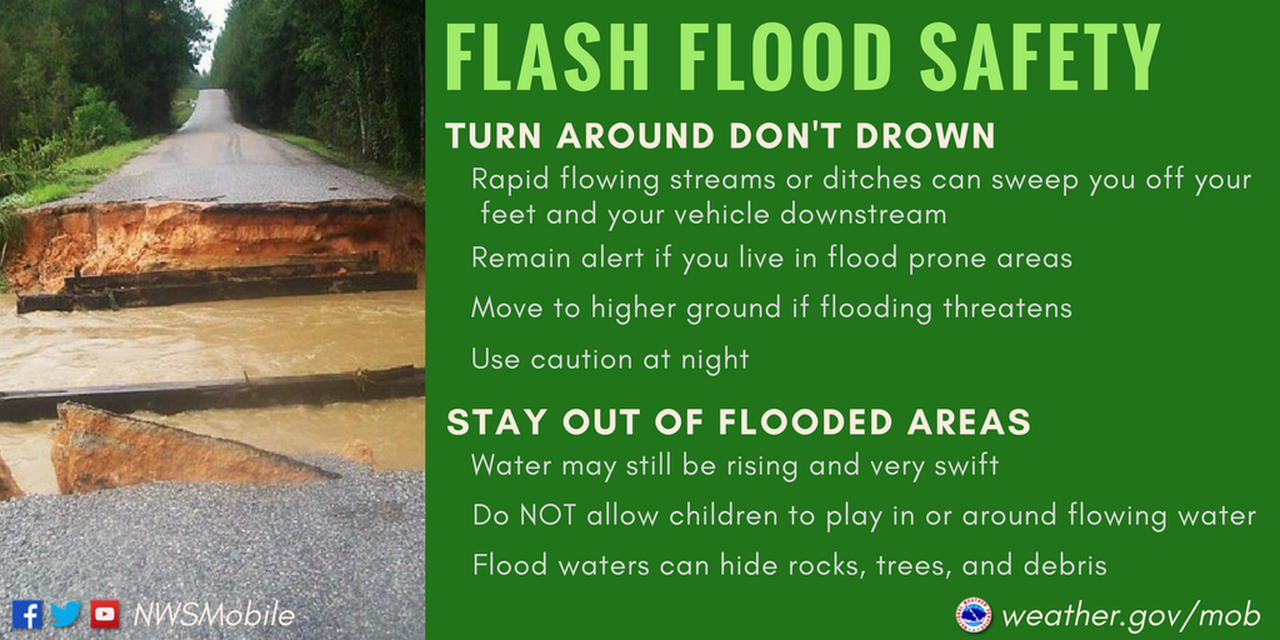Preparing For Flash Floods: Essential Information On Flood Warnings And Safety

Table of Contents
Understanding Flash Flood Warnings and Alerts
Knowing the difference between various alerts and recognizing the signs of an impending flash flood are critical first steps in safeguarding yourself and your loved ones.
Different Types of Warnings
Understanding the terminology used in flood warnings is vital. Here's a breakdown:
- Flood Watch: Conditions are favorable for flash flooding. Stay informed and be prepared to take action.
- Flash Flood Warning: Flash flooding is occurring or is imminent. Take immediate action to protect yourself and your property. Evacuate if instructed.
- Flash Flood Advisory: Flash flooding is possible. Be alert and monitor conditions closely.
Sources of Flood Information
Staying informed is key. Utilize multiple sources to receive timely and accurate warnings:
- NOAA Weather Radio: A dedicated weather radio provides continuous broadcasts of weather alerts, including flash flood warnings. It's a reliable, always-on source of information.
- Weather Apps: Numerous weather apps (like WeatherBug, AccuWeather, The Weather Channel) provide real-time alerts and forecasts directly to your smartphone. Ensure your location settings are accurate.
- Local News: Local television and radio stations offer up-to-the-minute weather reports and warnings specific to your area.
- Emergency Alerts: Sign up for your community's emergency alert system. These systems often send text messages or notifications directly to your phone when severe weather threatens.
Multiple sources provide redundancy – if one service is unavailable, you have backups.
Recognizing Flash Flood Signs
Don't wait for an official warning. Learn to recognize the visual indicators of a potential flash flood:
- Rapidly rising water levels: Noticeable increases in water levels in streams, rivers, or low-lying areas.
- Heavy rainfall: Intense, prolonged rainfall, especially in areas with poor drainage.
- Swollen rivers and streams: Rivers and streams overflowing their banks are a clear indication of potential flash flooding.
- Muddy water: A sudden change in water color to muddy brown suggests upstream flooding.
- Strangers leaving the area: If you see people rapidly leaving an area, it's a serious sign.
Creating a Flash Flood Preparedness Plan
Proactive planning significantly increases your chances of survival and minimizes damage.
Developing an Evacuation Plan
A well-rehearsed evacuation plan is crucial. Include:
- Designated meeting points: Establish several meeting points – one close to home and others further away, in case you’re separated.
- Escape routes: Identify multiple escape routes from your home and workplace, avoiding low-lying areas.
- Emergency kit: Pack a readily accessible emergency kit (discussed below).
- Practice: Conduct regular drills to ensure everyone knows the plan.
Building an Emergency Kit
Your emergency kit should contain:
- Water: One gallon per person per day for several days.
- Non-perishable food: Easy-to-prepare items like canned goods, energy bars, and dried fruit.
- First-aid kit: Include bandages, antiseptic wipes, pain relievers, and any personal medications.
- Flashlight and extra batteries: Essential for navigating dark conditions.
- Whistle: To signal for help if trapped.
- Important documents: Copies of identification, insurance policies, and medical records in a waterproof bag.
- Radio: A battery-powered radio to receive emergency broadcasts.
Protecting Your Property
Taking proactive steps can significantly reduce flood damage:
- Elevate electrical equipment: Move appliances and electronics to higher ground.
- Install flood barriers: Consider installing temporary or permanent flood barriers around your home's foundation.
- Clean gutters and downspouts: Ensure water drains efficiently away from your home.
- Reinforce weak points: Address any structural weaknesses in your home that could be vulnerable to flood damage.
Staying Safe During a Flash Flood
Knowing what to do during and after a flash flood is essential for survival.
Evacuation Procedures
If a flash flood warning is issued or you observe signs of imminent flooding:
- Obey evacuation orders: Immediate evacuation is critical.
- Move quickly and safely: Avoid low-lying areas, and never attempt to drive through floodwaters.
- Secure pets and valuables: Take your pets and essential documents with you.
If Trapped by a Flash Flood
If you are caught in a flash flood:
- Seek higher ground immediately: Climb to the roof of your car or a sturdy building.
- Signal for help: Use a whistle or bright clothing to attract attention.
- Call for help: If possible, contact emergency services.
- Do not drive through floodwaters: Even a few inches of water can sweep a vehicle away.
Post-Flood Safety
After the floodwaters recede:
- Avoid floodwaters: Contaminated water poses health risks.
- Check for structural damage: Carefully inspect your home for any damage before re-entering.
- Report damage to authorities: Contact your local authorities to report any damage and request assistance.
- Be aware of potential hazards: Watch out for downed power lines, unstable structures, and contaminated water.
Conclusion
Preparing for flash floods involves understanding warnings, developing a comprehensive preparedness plan, and knowing how to react during and after a flood. This includes recognizing warning signs, creating a detailed evacuation plan, building an emergency kit, and understanding how to protect your property. Remember, your safety and the safety of your loved ones are paramount. Prepare for flash floods today. Don't get caught unprepared: plan for flash floods now. Learn more about flash flood safety and preparedness and take action to protect yourself and your family.

Featured Posts
-
 F1 Drivers The New Kings Of Mens Style
May 26, 2025
F1 Drivers The New Kings Of Mens Style
May 26, 2025 -
 Melanie Thierry De Ses Debuts Au Cinema A Ses Roles Recents
May 26, 2025
Melanie Thierry De Ses Debuts Au Cinema A Ses Roles Recents
May 26, 2025 -
 Hoka Cielo X1 2 0 Running Shoe Review Performance And Comfort Analysis
May 26, 2025
Hoka Cielo X1 2 0 Running Shoe Review Performance And Comfort Analysis
May 26, 2025 -
 Le Sketch Du 128e Sexe Du Grand Cactus Decision Du Csa Et Analyse De La Polemique
May 26, 2025
Le Sketch Du 128e Sexe Du Grand Cactus Decision Du Csa Et Analyse De La Polemique
May 26, 2025 -
 59 Awards Myrtle Beach Newspaper Celebrates Sc Press Association Recognition
May 26, 2025
59 Awards Myrtle Beach Newspaper Celebrates Sc Press Association Recognition
May 26, 2025
